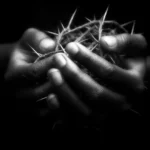“Pray without ceasing” is a tough command to live up to. Much of what we focus on today is the Do Not’s of God’s Word, but He has given us lots of To Do’s.
1 Thessalonians 5:17 is one of many commands Paul gives us To Do:
…pray without ceasing;
This, somewhat unbelievable task, is squeezed in between “Rejoice always” and “in everything give thanks…” (1 Thessalonians 5:16, 18). Then, as if that wasn’t enough to occupy my whole day, Paul adds that these previous things—rejoicing, continual prayer and giving thanks—are “God’s will for you in Christ Jesus” (v18).
As a young Christian and young adult, I heard these words preached from the pulpit. The preacher would stir up the crowd to Rejoice Always and everyone would respond with “Amen” and applause. Years later, rejoicing always, would even become a popular gospel song by Israel & The New Breed, Rejoice in the Lord Always.
I believed that we should and could always rejoice.
When the pastor proclaimed, “in everything give thanks,” we clapped our hands and some even stood to their feet. One woman waved a handkerchief to let us all know that she was on board with giving thanks – always.
I believed that we should and could be thankful for the great things God was doing in our lives, and even those painful things that He allowed to challenge and transform us.
But, “pray without ceasing”? Sure, people responded with a similar response, with cheers and Amen’s, but we all knew we were not really living out that command.
I believed that we should pray, but I didn’t believe that we could pray continually.
Did I mention that I was a young Christian and young adult at that time?
As a young Christian/Adult, the things that were at the forefront of my thoughts were being in love with my wife, getting a career, serving in Church, and taking care of my family that was continually growing.
When I heard the words, “pray without ceasing,” I envisioned a monk in a monastery, always on his knees before God. It was his morning, noon and evening activity. This could be the reason why most monks were going bald, but it was not a life for me.
I definitely prayed! I prayed when decisions were too hard for me to make on my own. I prayed when people were sick. I prayed when I needed something, but I also prayed just to have a conversation with God. I had a prayer life, but it was not “continually.”
As I matured in Christ and read His Word and walked with and learned from other believers, I began to learn that prayer was something we could always do. God was changing my perspective of what prayer looked like, which was partially correct. He was moving my understanding of prayer away from being an activity, to making prayer every part of my daily life.
Prayer is a conversation. It is a continual dialogue between you and the God of the Bible. You are praying when you are reading the Word. You are praying when you are thinking about what you read and asking God to give you some insight. You are praying before you pull out of your driveway or make your way to the bus stop. You are praying before you walk through the doors at your place of employment.
Prayer is not one moment in time, it is any time or any place that you put your thoughts on God and expect to hear a response, even if you don’t get a response immediately.
Sure, praying for someone on their death bed is intense and necessary. The stakes are high! If God does not answer quickly that person will die. Depending on your faith, that can either be a great thing or a terrible thing.
Yet, prayer that is woven throughout your day is less intense. There is not a need for God to do something immediately. It is the “without ceasing” that Paul is talking about.
Practicing in between.
One of my favorite authors is John C. Maxwell. There was a small blue book, with about fifty pages of text, that I bought to help bring me some encouragement. I felt like I needed to have encouraging words and YouTube had yet to be useful for motivational speeches.
From “Success, One Day at a Time”, A Most Valuable Lesson:
John Erskine learned the most valuable lesson of his life when he was only fourteen years old. His piano teacher asked him, “How many times a week do you practice, and how long do you practice each time?”
He told her that he tried to practice once daily for an hour or more.
“Don’t do that,” she responded. “When you grow up, time won’t come in long stretches. Practice in minutes, whenever you can find them—five or ten before school, after lunch, between chores. Spread your practice throughout the day, and music will become part of your life.”
Her advice obviously worked. Erskine became a concert pianist who performed with the New York Philharmonics, and he later served as president of the Juilliard School of Music and director of the Metropolitan Opera Association…
This is also true about prayer. Our lives can get so busy with things to do that it becomes harder and harder for us to set aside a time specifically for communicating with God. However, if we spent the moments in between our everyday activities, we would find that we are spending many hours talking with God.
And it won’t just be about how to make a godly decision in moments of crisis, but it will expand to include praying for the people who around you.
It could be: talking to God about that woman you saw three people ahead of you on the checkout line. She looked depressed and in that moment, you talk with God, asking Him to lift up her spirit. God may talk back to you and tell you to give her a smile or maybe a scripture verse pops up in your head like, “Encourage the exhausted, and strengthen the feeble,” from Isaiah 35:3.
Praying without ceasing is not the job of super Christians who have made prayer their vocation. It is a command given to each and every one of us who believe in the Gospel of Jesus Christ and believe that our lives belong to Him.
Take some time today to practice praying in between your activities. Start out with a few words, possibly even telling God what you are thankful for and then just talk with Him. You will see that the more you put God in between your activities, the more you will spend time praying without ceasing.












Recent Comments